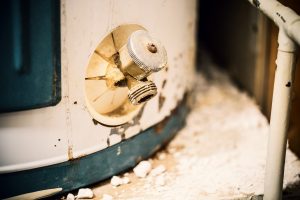
If your water heater is showing red flags that something might be wrong, it may be time to schedule a water heater repair in Lawrenceville. The question is, what are those signs that you need to be watching for? Basically, anything out of the ordinary should be concerning.
What are the top signs you need to schedule water heater repair?
- Unusual noises: Popping, rumbling, or tapping often signal sediment or mineral buildup at the tank’s bottom, which can damage the system and reduce efficiency.
- Leaks or moisture: Even minor drips indicate internal corrosion or failed valves, fixing these early prevents bigger damage and high water bills.
- Rusty or discolored water: Visible rust on external components, or rusty hot water, means tank corrosion and often requires replacement of parts or the entire unit.
We’re highlighting a few key ways that you can know something is going on with your water heater. Keep reading to learn some signs that mean you need to schedule service right away, even if you are in between regular annual maintenance appointments.
Unusual Noises
If your water heater begins to make a kettling or tapping sound, it’s time to schedule a repair appointment. This particular noise means that the minerals from hard water are building up inside of your water heater. When the water begins to heat up, these minerals move around resulting in the tapping or kettling sounds that you hear.
The problem with this is the abrasive minerals can corrode the inside of your water heater tank and lead it to have a shorter lifespan. Ideally, you want to schedule maintenance once each year for your water heater so we can flush out the system and keep up with eliminating mineral buildup. But if you haven’t scheduled maintenance in a while, a repair appointment may be needed to go ahead and address those issues.
Leaks
Your water heater has to be completely airtight in order to produce the best results for your home. It’s easy to think that a drip here or there is not a big deal, but it really is. Your water heater should never leak, and if it does you need to schedule a repair appointment with our team ASAP.
A water leak means that air is also getting into your water heater, which can negatively impact how it operates and even speed up corrosion. Plus, a leak is potentially costing you a lot on your monthly water bill depending on how bad the leak is
Rust
If you notice any external signs of rust on your water heater, that’s a big problem. Rust cannot be reversed and any parts that are rusting need to be completely replaced. If something like a valve rusts, we can easily take that individual component and replace it before the rust spreads. However, if rust begins to develop inside of the tank itself, then the entire tank needs to be replaced.
This rust is transferring into your water and there is no way to prevent it from spreading. Eventually, a rusty water tank will corrode to the point that you cannot use it anymore. Following a repair appointment, you can prioritize scheduling maintenance annually to prevent the same problems from happening again in the future.
Frequently Asked Questions
Question: What are the top signs that I need to schedule water heater repair?
Answer: Key signs include strange noises from the tank, inconsistent or reduced hot water, discolored or rusty water, and visible leaks or pooling water around the heater. These symptoms indicate the unit may need professional attention.
Question: Could strange sounds from the tank mean trouble?
Answer: Yes, popping, rumbling, or banging noises often mean sediment has built up inside the tank. This buildup can reduce efficiency and lead to damage, so it’s best to have a plumber check it out.
Question: Is discolored or rusty hot water a warning sign?
Answer: Absolutely. Rusty or brownish water suggests corrosion inside your tank or pipes. If not addressed, it could lead to leaks or contamination of your home’s water supply.
Question: When does low or fluctuating hot water temperature mean repair is needed?
Answer: If your water isn’t staying hot or fluctuates unexpectedly, your heater’s thermostat, heating element, or sediment buildup might be to blame. These are issues a technician should inspect and fix.
Question: How does the water heater’s age affect repair decisions?
Answer: Traditional water heaters typically last 8–12 years. If your unit is older and showing signs of wear, repairs may be a short-term fix, and replacement could be more cost-effective.
Your Comfort Is OUR Business. Contact the team at Snellville Heating today to schedule an appointment for the highest quality HVAC services.



